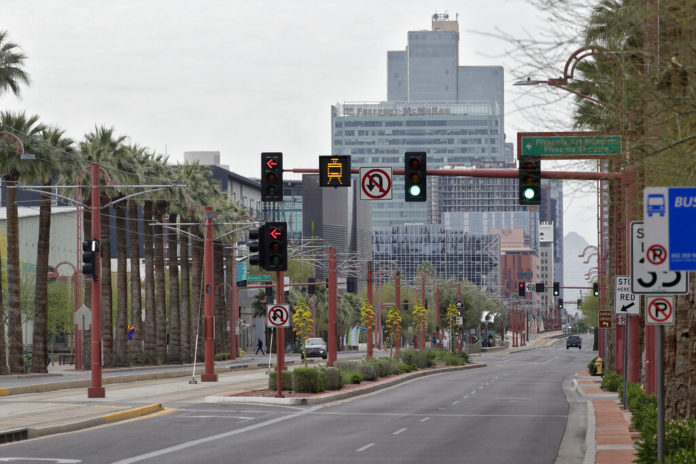
Arizona cities and counties will get $440 million in federal money to help them deal with budget issues stemming from the coronavirus outbreak, Gov. Doug Ducey announced Wednesday.
The money will come from $1.9 billion in federal coronavirus relief funds that Ducey can spend at his discretion.
Local governments saw their costs spike for police and firefighters at the same time that sales tax revenue plummeted as people stayed home to slow the spread of the virus.
Ducey said the cities have flexibility in how to spend the money, though the federal government requires that they cover expenses related to the virus.
“I don’t like it when the federal government makes governors stand in line and beg, ‘Mother may I?’” Ducey said during a discussion with several mayors. “And I don’t want to do that to our local leaders either.”
That flexibility involves some budgetary sleight of hand that the governor’s office suggested: Cities can cover their police and fire budgets with the new federal funds, freeing up that money for other uses. That’s critical because cities face large budget deficits due to business shutdowns triggered by the coronavirus.
Mayors from a half-dozen cities attended a Wednesday meeting with Ducey and outlined various ways they plan to spend the new cash. They include public safety but also promoting tourism, giving grants or loans to small businesses and business development projects.
Ducey also said the state will provide up to $150 million in cash advances to cover emergency costs for which local governments, hospitals, schools, nonprofits and other organizations expect to eventually be reimbursed by the Federal Emergency Management Agency.
Some mayors and county officials have pressured Ducey for weeks to release funds to local governments. Among the most vocal were officials in Pinal County, where the Board of Supervisors voted unanimously this month to begin drafting a lawsuit seeking to force Ducey’s hand.
Ducey said that delay was justified because of the uncertainty surrounding the effects on state coffers and because they needed additional U.S. Treasury Department guidance.
“We wanted to do it the right way, we wanted input from local leaders as to what was needed,” Ducey said. “And we also wanted to have some idea around our revenues in Arizona, where our economy was.”
Arizona’s three largest cities and two largest counties got money directly from the federal relief package known as the CARES Act. Phoenix, Tucson, Mesa and the counties of Maricopa and Pima collectively received $960 million. Some have already begun spending it on small business assistance, rent and mortgage help, protective equipment, internet connections for children who don’t have access at home and other initiatives.
Arizona’s 88 other cities and 13 other counties said Congress intended for them to get a piece of the nearly $1.9 billion that’s earmarked for the state. Even after the money sent to cities and counties, Ducey will have more than $1.5 billion.
Ducey did not detail how he’d spend the rest of the money he controls but said he’d look to support the health system and social safety net, and boost the state’s unemployment trust fund. The state has logged more than 572,000 new unemployment claims since late March, pushing the unemployment rate above 16%.
“The reason it’s not the full amount is there are going to be needs that are yet unforeseen at the state level,” Ducey said. “We want to ensure that we have enough to pay and replenish our unemployment benefits.”
Peoria Mayor Cathy Carlat told Ducey the money will help her city reimburse its costs and provide grants or loans to small businesses.
“They’ve taken a lot of hits,” Carlat said of small businesses. “These people have saved their whole life to run these family businesses.”
In other developments Wednesday:
— State health officials reported 479 additional COVID-19 cases with 24 additional deaths, increasing the state’s totals to 17,262 cases with 831 deaths.
Republished with the permission of the Associated Press.














